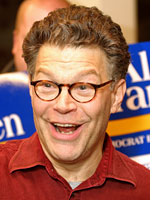The Minnesota Senate Candidate Has Been Telling Jokes For 30 Years. How Does He Explain Away The Bad Ones?
By Michael Kinsley
Slate Magazine Online
Posted Monday, July 7, 2008, at 11:56 AM ET

|
Americans say they want to be represented by "real people" and not by "professional politicians." But with their votes, they reward professionalism and drain the reality from politics. Real people haven't spent their lives plotting a political career, and therefore real people may have said things from time to time that an aspiring politician would not. Departures from the official script are called gaffes. This election year, the script has been more important than ever. Despite the Iraq war, despite the sinking economy, despite the price of gasoline, we have frittered away our politics in a round robin of gaffes, mock indignation, demands for apology, and more gaffes.
The surest way to stumble into a gaffe is to tell a joke. Jokes are risky; they are a game of percentages. That is why jokes are best left to professional jokesters. Certainly they are too dangerous for politicians to play with. Any joke that doesn't offend at least a few people is unlikely to be funny. You have to hope that many more will be amused than are offended. You have to come as close as you can to the line of justifiable, widespread offense without crossing it. This is why I never found George Carlin, who died two weeks ago, terribly funny: He walked up to the line and simply crossed it. Where is the art in that?
|
The professional politician, by contrast, lives to avoid giving offense. This isn't easy, because in today's culture of umbrage, taking offense is a major sport. Everybody is on hair-trigger alert. And once a voter is offended, he or she is probably lost. On the other hand, keeping the voters amused is difficult and probably not worth the trouble. A voter who is amused may vote against you anyway or may seize an opportunity to take offense and turn against you tomorrow.
This year a professional jokester, Al Franken (a Democrat), is challenging a professional politician, incumbent Norm Coleman (a Republican), for a Senate seat from Minnesota. Not every joke Franken wrote or told over a third of a century in the joke business was hilarious, OK? Minnesota voters will have to decide whether their dislike of professional politicians trumps their enjoyment in taking umbrage or vice versa. Coleman is a man of no interest, a run-of-the-mill political hypocrite who started out as a standard-issue long-haired student rebel leader on Long Island in the 1960s and surfed the zeitgeist: Now he is a standard-issue pro-war, tax-cut Republican. Franken, by contrast, needs no introduction and would be one of the most interesting people in the Senate from day one. Interesting isn't the most important quality in a senator. Honest, smart, and (for my taste) liberal are more important. But interesting would be nice.
Franken's problem is that he spent three decades as a professional comedian before turning to politics and has a large inventory of potential gaffe material to explain away: a 1995 magazine article describing Franken proposing rude, unfunny jokes about rape at a Saturday Night Live staff meeting; a 2000 article in Playboy in which he fantasized about three-way sex with robots (or something); an ungallant crack about women in Afghanistan (a place Franken has visited repeatedly with the USO); and so on. Take the SNL staff meeting. None of Franken's rude fantasies made it onto the air, and there is no evidence that he especially wanted them to. He was thinking out loud, an activity vital to professional comics and fatal to professional politicians. The only way a meeting to plan a comedy show can possibly work is if everybody feels free to say absolutely anything. If comedy writers are thinking, "I'd better not say that because it may not be funny and in 13 years I may decide to run for the Senate," we will end up with fewer good jokes on TV and fewer interesting people in the Senate.
Franken (a slight but friendly acquaintance of mine) is in a quandary. He can't stop his campaign to defend every joke he's ever written that someone now finds offensive—or pretends to. Trying to explain a joke is notoriously pointless, anyway. But Franken also can't let his opponent create the impression that he is some kind of sexist monster rather than the long-married, deeply uxorious family man that he is, with the progressive views on abortion choice and related issues that you would expect from a Democratic liberal. If the voters of Minnesota would rather be represented by a hack like Norm Coleman than laugh off a few jokes that didn't work, then they should stop complaining about being stuck with professional politicians. And the real joke will be on them.
Michael Kinsley is a columnist for Time and the founding editor of Slate.
Article URL: http://www.slate.com/id/2194926/
Copyright 2008 Washingtonpost.Newsweek Interactive Co. LLC
